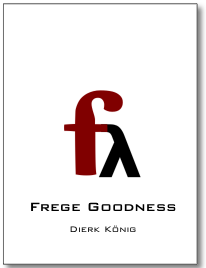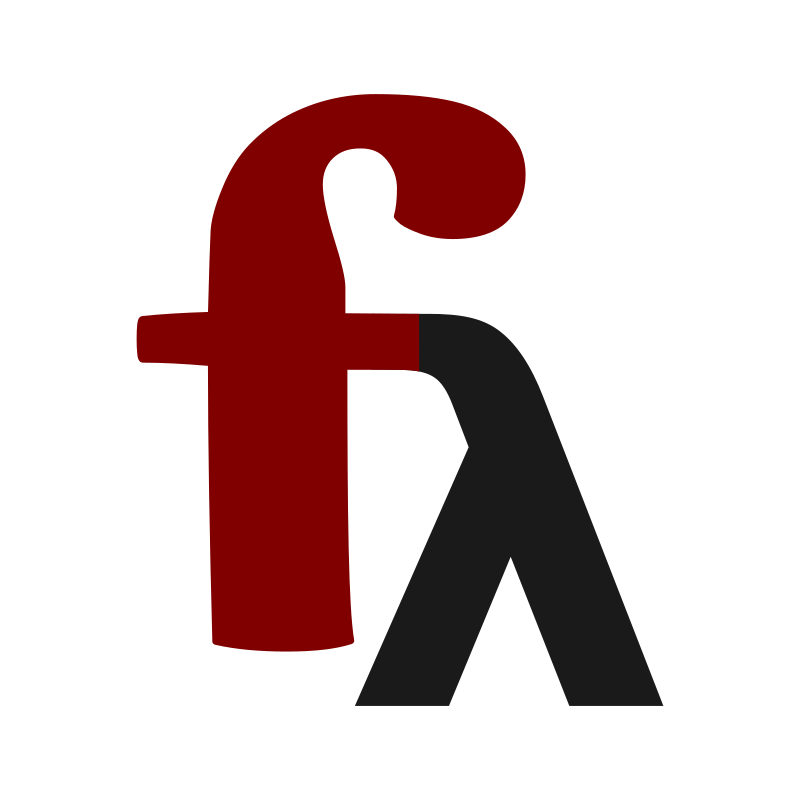Frege is a Haskell for the JVM.
Like any Haskell, it is purely functional, enjoys a strong static type system with global type inference and non-strict - also known as lazy - evaluation.
Frege compiles to Java, runs on the JVM, and uses any Java library you want. It can be used inside any Java project.
1. Hello World
This is the classic starter with a slight extension to show the fluent usage from Java and the benefits of having a type system that can recognize purity.
module Hello where
greeting friend = "Hello, " ++ friend ++ "!"
main args = do
println (greeting "World")This code will compile to Hello.class and Hello.java with a regular Java main method that one can start the usual Java way.
Moreover, the Hello.class will have a method
public static String greeting(String ...) {...}
that one can call from Java or any other JVM language.
The greeting function is pure, meaning it is stateless and free of side effects.
Therefore, it is threadsafe and its results may be automatically cached since given the same argument, the result will always be the same.
The main function is impure. It takes a list of Strings and does not return just "void" as in most other JVM languages but the
type IO (), telling that it may produce side effects like printing to the console. The Frege type system guarantees
that any caller of main must also be of some IO type and is thus also marked as impure. That way, the lack of purity percolates up the whole call chain.
"Hello World" already shows the tenet of "islands of purity" (greeting) in a "sea of imperative code" (main).
Since the purity information is carried through the type system, the compiler can potentially use it for many optimizations such as pre-calculation, deferred execution, parallel execution, caching, and elimination of common subexpressions.
Frege is strongly and statically typed, even though we haven't declared any types in the code above. If not declared, the types are inferred. When declared, the given types are checked against the inferred ones.
2. Expressive code
Much can be achieved in Frege in one line of code and here is an example that you can paste into the
Online REPL. It calculates pythagorean triples below 10 with the help of a list comprehension:
[ (x,y,z) | x <- [1..10], y <- [x..10], z <- [x..10], x*x + y*y == z*z ]
After execution you should see a list of triples containing the solutions (3, 4, 5) and (6, 8, 10).
Such a comprehension reads almost like an SQL statement:
- select the triple
(x,y,z) - with
xdrawn from the list of1to10,yfromxto10, andzfromxto10 - where
x*x + y*y == z*z
There are much more elegant and efficient ways to calculate the triples but those are a bit less obvious.
3. No mutable state
Mutable state is the source of many bugs and makes code less modular. Frege allows interesting ways to avoid it. That style is very unfamiliar to many developers that come from the imperative world. Be brave. It is different but there are a huge benefits to be discovered.
Let's go for a more advanced example where we calculate the fixpoint of the cosine function, i.e. the
value where cos(x) == x.
Implementations in imperative languages usually involve introducing local mutable state. Not so in Frege:
import frege.prelude.Math (cos)
cosines = iterate cos 1.0
pairsOf xs = zip xs (tail xs)
head [ x | (x,y) <- pairsOf cosines, x == y] After execution it should show you the value
0.7390851332151607
The code is most likely incomprehensible for a Frege/Haskell newcomer at first but it becomes less intimidating once you know the parts. With a bit of experience, you may even find it clear and obvious.
- Again, we have a list comprehension. We get a list of
xvalues but we only need the first element, thehead. - The
xcomes from an(x,y)pair wherex == y. - The
(x,y)pair is drawn from a list of pairs of cosine values. - The
cosinesare an infinite list of cosine values that starts withcos 1.0and theniterates tocos(cos(1.0)),cos(cos(cos(1.0))), and so forth. - Please note that the
=signs do not denote assignment but a definition. There are no assignment in Frege! - The
pairsOffunction works on any list of values to create pairs of any adjacent values. It useszip, which is an often-used construction for this task, but the details are not relevant here.
This code is pure. The inferred type is Double.
The code does not rely on any mutable state (not even internally). Therefore it is threadsafe and the result can be automatically cached.
For the Java programmer
Frege offers you the opportunity to learn and use a new programming paradigm that shines with
- a solid mathematical foundation,
- pure functions,
- immutability by default,
- side-effects only when declared,
- robustness under composition and concurrency,
- and a type system that is unparalleled on the JVM with its combination of power, simplicity and expressiveness.
You can still reuse your existing knowledge of the Java platform and its vast set of libraries. Frege interoperates with Java such that you can easily call Frege from Java code and vice versa. But unlike other approaches, calling Java from Frege doesn't undermine the language guarantees.
When calling Java from Frege, you have to declare the Java types in rigid Frege terms in order to preserve the Haskell language characteristics, especially purity, thread safety, and lazy evaluation.
Learning Frege essentially means that you will also learn Haskell and thus your effort pays off twice, since you also get to know a very popular non-JVM language with 25+ years of development, a great community, many (free) books, publications, tutorials, online courses, and considerable industry demand.
For the Haskell programmer
Frege gives you the opportunity to use your skills on the JVM. Most idiomatic Haskell code will run in Frege unmodified or with only minimal, obvious adaptations. Even more important: you can bring your purely functional problem solution strategies to your Java projects.
From now on you can also enjoy on the JVM:
- the terse Haskell syntax
- pure functions and lambdas
- algebraic data types and typeclasses with parametric polymorphism
- powerful type inference
- higher rank types
- lazy evaluation on infinite data structures
- pattern matching, list comprehensions, do-notation, point-free style, operators, modules
- functors, monoids, semigroups, monads, and all your other beloved mathematical abstractions.
Frege aims at compiling most "vanilla" Haskell code that has no external dependencies "as is" or with only minimal, obvious changes. Likewise, Frege code that makes no use of JVM specifics should easily run through other Haskell compilers. We are currently in the progress of coming closer to this goal by ironing out insubstantial differences.
The Frege programming language is named after and in honor of Gottlob Frege who published the ideas of higher-order functions, partial function application, and many more concepts of formal logic that we now take for granted back in the 19th century.
If you are curious how this name is pronounced, you can use this translator page to get it right. Just click the audio symbol in the left (german) part.
The compiler, an Eclipse plugin and a provisional version of the documentation can be downloaded. Note that Frege requires at least JDK 7 to compile and run programs.
A number of tools are written in Frege:
- the Frege compiler itself,
- the Frege standard library,
- the Frege command-line REPL,
- the Frege web-based, full-stack interactive online REPL,
- the FregeFX REPL - a JavaFX view on the REPL,
- the Frege Eclipse plugin,
- and the documentation tool.
This should speak for itself regarding stability, functional completeness and performance of the language.
The documentation is provisional and the library supports almost all of the Haskell 2010 standard library with the remaining known differences being there for good reason.
See the Getting Started page for getting started at the command-line or read the Eclipse plugin page. You can develop Frege inside Intellij IDEA and there is build automation support for Maven, Gradle, Leinigen, SBT, and Bazel.
The awesome QuickCheck library for advanced unit testing comes bundled with the language.
- Hoogle for Frege, a Frege API search engine, by Neil Mitchell and Marimuthu Madasamy
- The REPL projects, consisting of core JSR 223 scripting support, interface for the command-line and online REPL, all written and maintained by Marimuthu Madasamy, and the FregeFX REPL with a JavaFX view by Dierk König
- Support for web applications and web services
- Maven Compiler Plugin for the Frege language, by Mark Derricut
- Frege compiler/library as an OSGi bundle, by Mark Derricut
- Apache Maven Tile for the Frege Programming Language, by Mark Derricut
- A Leiningen plugin to compile Frege code, by Sean Corfield
- Gradle Frege plugin, by Mark Perry and Dierk König
- Real World Frege, by Dierk König
- sbt Frege plugin, by James Douglas
- An efficient Frege Ray-Tracer, by Michael Chavinda
- Frege Chat, Winner at JavaOne 2016 language competition, Dierk König
If you are interested in contributing, here are some hot topics:
- Write Frege code to support more of the Java API.
- Port Haskell libraries or tools.
- Open issues in the issues tracker if you find bugs, errors in documentation, etc.
- Help make Frege popular by writing code for projects like Rosetta Code, or PLEAC.
- Contribute to the related projects mentioned above, or make your own.
Meet Frege friends in person
Talk to us at any of the upcoming events or view historic presentation slides and videos!
For discussions
You can contact the project members through the discussion group devoted to the Frege programming language.
For questions
Specific programming problems are best solved on Stack Overflow, we check questions tagged "frege" on a regular basis.
For casual chat (and quick questions)
There's a #frege channel on Freenode IRC where some project members and Frege users hang out. You can use any IRC client you like or Freenode's WebChat interface if you don't want to install IRC software.
Staying up to date
- YouTube playlist
- Twitter: @fregelang
- Facebook: fregelang
- Reddit: /r/frege
For issues only
If you find a bug or have an idea for enhancements, please let us know by opening an issue in the issue tracker. (You'll need a GitHub account to do this.) Please keep discussions to the forum and questions to Stack Overflow.
- Frege Wiki
- Language reference
- InfoQ Article on Frege's history, current state, and future plans
- Author's Blog, Dierk's Blog
- edX Functional Programming course FP101x with exercises in Frege
- Functional Programming 13 videos by Dr. Erik Meijer
 Introduction to Frege: video, slides
Introduction to Frege: video, slides- The Frege Goodness free ebook
Recommended reading
- John Hughes: Why functional programming matters
- Book: Real-World Haskell (free online)
- Book: Learn you a Haskell (free online)
- Book: Programming in Haskell
Copyright (c) Ingo Wechsung, 2011-2016. All rights reserved. The use and distribution terms for this software are covered by the BSD 3-clause license which can be found in the file LICENSE.txt at the root of this distribution. By using this software in any fashion, you are agreeing to be bound by the terms of this license. You must not remove this notice, or any other, from this software.
